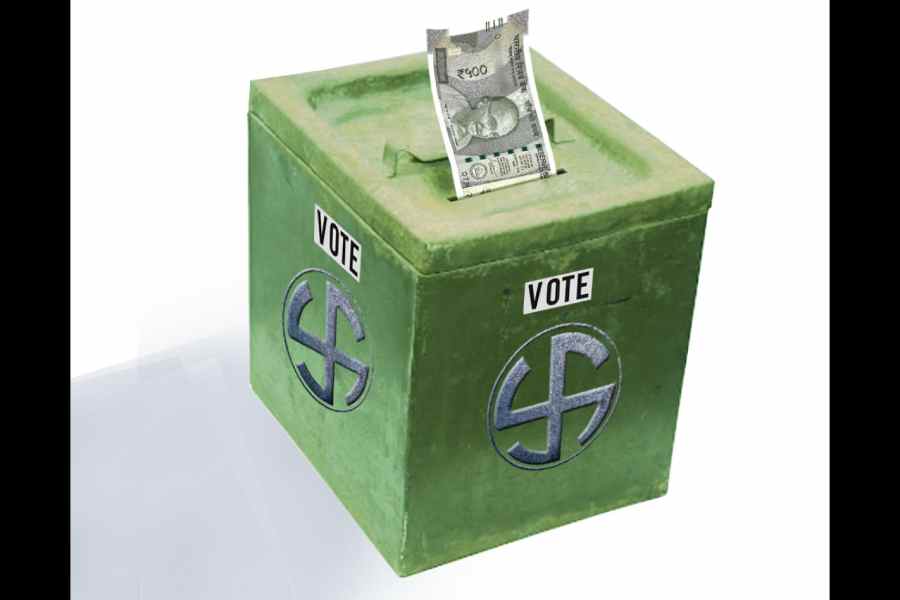The dark cloud over the funding of political parties through the controversial electoral bonds has started to lift — but very slowly, leaving many disappointed with the pace and quality of the disclosures.
The first data dump put out last Thursday covered the period between April 12, 2019, and February 15, 2024 — a little short of five years.
But the curious always wanted to know whether the disclosures relating to electoral bond funding in the period before that would ever come out.
On Sunday, the latest data dump — based on information the political parties had provided in sealed envelopes to the Supreme Court when it was hearing the petitions challenging the constitutionality of the electoral bond scheme — lifted the veil of secrecy just a little more. But it fell way short of providing complete clarity.
The big revelation was that the ruling BJP had received bonds worth Rs 3,961 crore up to May 10, 2019.
But the party left everyone a little befuddled by putting two different data tables for the financial year 2019-20: the first table in Box 1 put the bond funding at Rs 2,555.00 crore, showing collections till January 22, 2020.
The other table given in the sealed envelope to the Supreme Court put the figure at Rs 2,301.82 crore.
The dataset released last Thursday had shown that the BJP had received about Rs 6,060 crore between April 12, 2019, and February 2024.
If the information given in the sealed envelope is considered, there is roughly a one-month overlap between the two datasets. But the manner in which the information has been provided makes it a little difficult to cut out the overlaps and obtain a smooth, continuous waterfall of information on the electoral bond funding that the BJP received.
Confusion over the statistics of the electoral bond funding prevails because it seems that each political party has chosen its own format for disclosure.
At least two parties — Trinamul and the Congress — have shared the details of their current accounts with the State Bank of India. The Trinamul account shows a closing balance of Rs 74.99 crore as of May 22, 2019.
The Congress, however, has shown a closing balance of Rs 35.71 crore on May 20, 2019.
Many of the political parties feigned ignorance about the identity of the donors.
Trinamul argued in its letter to the Election Commission that “bonds are bearer bonds and no details of the purchaser are printed on the bonds”.
It added that most of these bonds were dropped into the office drop box or “sent through messengers” by supporters who wished to remain anonymous.
Some political parties, though, seemed to have no problem identifying their donors.
The big surprise was that software giant Infosys Technologies provided electoral bonds worth Rs 1 crore to H.D. Deve Gowda’s Janata Dal Secular in March 2018 to help the party contest the Karnataka Assembly elections, according to the party’s disclosure to the chief election commissioner in May 2019.
Infosys hasn’t figured anywhere on the list of companies that bought electoral bonds.
The JDS said the Embassy Group — one of the country’s leading real estate companies — had provided Rs 22 crore in six tranches to the party between March and May 2018.
Well-known pharmaceutical company Biocon provided Rs 2 crore to the party in two separate transactions. Sajjan Jindal’s JSW Steel forked out Rs 5 crore, battery maker Amar Raja Group gave Rs 2 crore, and the Aditya Birla Group provided Rs 50 lakh.
The Aam Admi Party (AAP) received Rs 3 crore from the Bajaj group, Rs 1 crore from Torrent Pharmaceuticals and another Rs 1 crore from BG Shirke Constructions Technologies. Its total collections were a modest Rs 5.75 crore till May 29, 2019.
Data showed that Future Gaming and Services provided Rs 509 crore to the DMK and Megha Engineering Rs 105 crore to the DMK. Other donors included the Apollo Group, India Cements, Ramco Cements and Triveni.
The DMK said it had received Rs 45.50 crore in 2019-20 and Rs 80 crore in 2020-21 before the collections jumped to Rs 306 crore in 2021-22 and Rs 185 crore in 2022-23. In the current fiscal, it has raised Rs 40 crore through the electoral bonds — creating a formidable war chest ahead of the imminent general election.
Chennai Super Kings Cricket Ltd — owner of the eponymous IPL team — paid out Rs 5 crore to the AIADMK, and Coimbatore-based Lakshmi Machine Works chipped in with another Rs 1 crore. The party got most of its collection of Rs 6.05 crore from these two donors.











